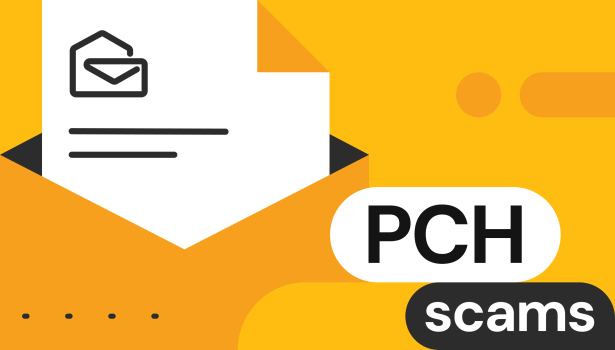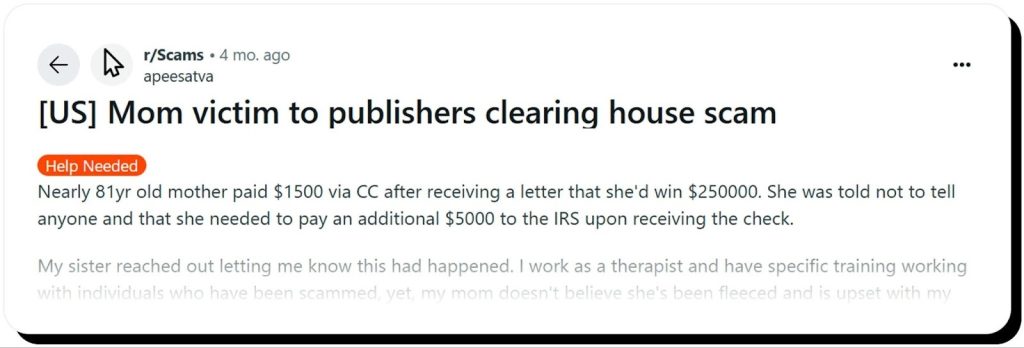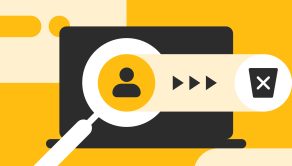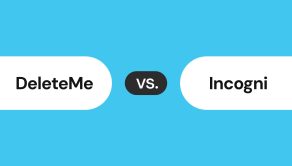Publishers Clearing House scams: what you need to know

Many people in the U.S. are familiar with Publishers Clearing House (PCH), one of the oldest and most well-known sweepstakes companies behind many large prize giveaways. Founded back in 1953, it has now grown into “America’s favorite sweepstakes,” by its own admission, sending its famous “Prize Patrol” to the doorsteps of large-prize winners.
This reputation, however, also creates a wave of Publishers Clearing House scams by imposters who impersonate the famous brand, defraud people of money, and steal their personal information.
Let’s look at what’s real and what’s fake when it comes to winning a PCH sweepstake, how to recognize a scam when you see one, and what to do to protect yourself and your loved ones from PCH impersonators.
What is Publishers Clearing House (PCH)?
Publishers Clearing House is a legitimate U.S.-based company that initially specialized in marketing magazine subscriptions and related merchandise but started offering sweepstakes and prize-based games in 1967.
The company runs the so-called Prize Patrol that visits major-prize winners in person to hand them a large check, often with a film crew. Awards smaller than $10,000 are typically mailed with a check.
The company has been through ups and downs over the years, surviving a number of legal actions and consumer protection complaints. In a recent action by the FTC, PCH was ordered to issue refunds to over 281,000 customers totalling $18 million due to the use of misleading language in their email correspondence, implying that a purchase was required to enter a contest or improve the chances of winning.
In April 2025, PCH filed for Chapter 11 bankruptcy protection, leaving many of its large-prize winners unpaid. Acquired by ARB Interactive, an online casino operator, a few months later, Publishers Clearing House continues its operations as usual and is set to restore its reputation as a reliable and trustworthy sweepstakes provider. However, the new owner is said to be liable only for prizes won after July 15, 2025.
Is Publishers Clearing House legit?
Yes, Publishers Clearing House is a legitimate company offering real sweepstakes and giveaway prizes. It’s been operating for over seven decades and over these years has become a staple of American culture with its signature in-person visits to hand over giant checks to winners at their doors.
Yet many PCH impersonators discredit this brand name, reaching out to people throughout the country and claiming they’ve won. In reality, these fraudsters are looking to get money from “winners” along with their personally identifiable information that can be misused in further scams and identity theft.
How Publishers Clearing House scams work
Here’s the general mechanism of how PCH scams operate:
- It starts with impersonation, where scammers pose as PCH representatives, sometimes adopting the names of real employees and Prize Patrol members.
- Scammers contact their targets via phone calls, emails, text messages, or even direct messages on social media, claiming they’ve won a huge money prize, often exceeding a million dollars. To identify their victims, fraudsters may go through data breach dumps on the dark web or harvest personal and contact details from data brokers and people-search websites.
- Then come the instructions to claim the prize. There’s always a catch when it comes to claiming the big prizes announced by scammers. In case of PCH impersonation, “winners” often need to pay a portion of their prize to cover “processing fees,” “taxes,” “paperwork,” or “shipping.” In some cases, there’s a fake check that the “winner” is asked to deposit at their bank, then send a portion of it back to cover the associated expenses. In other cases, scammers request that payments be made via wire transfers, gift cards, Zelle, or PayPal.
- Scammers may request personal information, such as credit card data, Social Security number, or a driver’s license, in order to confirm the “winner’s” identity or claim the prize.
- There’s secrecy and pressure to act now. Scammers want you to act fast before you can start doubting their legitimacy or tell others who might recognize the scam and discourage you from sending money and personal details to criminals.

PCH scams are typical examples of brand impersonation scams that target thousands of people worldwide. For example, the top three impersonated brands in the U.S. are Best Buy (read more in our guide to Geek Squad scams), Amazon, and PayPal. This is a widely used scamming tactic, as consumers tend to lower their guard when it comes to well-known and trusted companies and thus are easier to deceive.
Common PCH scam tactics
PCH scammers use multiple tactics, but it’s important to know that none of them are used by legitimate PCH representatives to contact winners about their prizes. Whether it’s checks found in your mail with detailed instructions on how to send a share of them back to the “company” or the IRS, phone calls, or messages on Facebook, all of these expose scammers looking to get hold of your money, not give it to you.
Fake check deposits
The fake check scam is one of the most common variations of PCH impersonation. Scammers may mail you a check in an official-looking letter that announces you have won a prize and are eligible for an “advance” on it in the form of the check amount. However, after depositing the check, you are instructed to transfer a portion of it back to cover some fees, taxes, or other associated expenses. After that, you will supposedly receive the full prize, which often ranges from hundreds of thousands to millions of dollars.
The check may look real but, in reality, is fake. Once you deposit it, the money may appear in your account for some time, but then the forged check bounces, sometimes weeks later. As a result, you’re left with a negative balance if you withdrew any money. That means you will owe your bank the full amount of the check, while the scammers keep the real money you sent them.

Why it’s a scam:
- The real Publishers Clearing House never requires you to pay money to enter a sweepstake or claim your prize. This includes paying any fees, taxes, or deposits.
- If you’re a real PCH winner, they will notify you via overnight delivery services (FedEx, UPS) or certified mail if your prize is below $10,000. In case your winnings are higher, they will contact you in person.
- If you’re a real PCH winner and find a check in official mail, it won’t request that you pay back a portion of the check for any expenses. Winning with PCH is always free.
Publishers Clearing House scam calls
Scam-calling is another tactic used by PCH imposters. They may use spoofed caller IDs to make you believe it’s the real Publishers Clearing House and then go on to say you need to pay associated fees and taxes or send them money to enter a sweepstake or claim your prize.

In many cases, scammers will require your sensitive information to “confirm” your identity, such as your national ID, Social Security number, driver’s license, credit card data, and address.

Why it’s a scam:
- Publishers Clearing House never calls consumers to discuss a sweepstake entry or to announce prizes. The real PCH only uses mail and in-person visits by its Prize Patrol.
- Entering, winning, and claiming a prize in a PCH sweepstake or online contest is completely free. If someone requests that you send a payment in exchange for getting the prize, it’s most certainly a Publishers Clearing House phone scam.
Fake PCH emails
Like phone calls and fake checks in the mail, fake PCH emails are sent to mislead unaware recipients into thinking they’ve won a huge sum of money. In addition to requesting the “winner” to pay a certain amount to cover “processing fees” or “taxes,” these emails can be used as phishing traps, guiding users to enter their sensitive information on malicious websites.
Such emails from PCH impersonators may require you to “confirm” your identity by entering your personally identifiable information such as your national ID or SSN, or “validate” your credit card by entering its details in a special form. Once you share this information, it will be stolen by scammers, who will then be able to exploit it for financial fraud.
A similar tactic is used in Norton LifeLock scam emails, which impersonate the well-known cybersecurity brand to make users unwittingly share their payment card information with bad actors.
Why it’s a scam:
- The real PCH never emails winners to announce they’ve won a major prize in its sweepstake. PCH may only notify users via email about their online contest entries.
- Legitimate PCH communications never asks for personal and financial information via email.
- PCH never asks winners to pay for anything in order to claim their prize.
Social media messages and fake profiles
Scammers pretend to be PCH employees and the Prize Patrol members on social media platforms, impersonating them through fake profiles. They may appear in direct messages on Facebook, Instagram, Twitter (X), or TikTok, claiming you’ve won but need to provide additional information or send money to claim your prize.
These fake accounts often try to mimic official PCH communication and branding but have subtle discrepancies, such as odd names, new profiles, few followers, and poor grammar.
This is a note about avoiding scammers from the official PCH Prize Patrol page on Facebook:
Why it’s a scam:
- PCH never notifies winners on social media, whether through direct messages or otherwise.
- No PCH representative sends out friend requests to sweepstakes winners.
- The only official ways to contact PCH winners are via mail, overnight delivery services, or in person.

Red flags of Publishers Clearing House scams
Watch out for these warning signs of PCH scams:
- You’re contacted about your PCH prize winning out of the blue via email, phone call, mailed check, or a private message on social media, even though you don’t remember entering any PCH sweepstakes or contests.
- If you’re contacted via email, the subject line may sound alarming or deceptive on purpose, for example “Tax form enclosed,” “Legal notice from PCH,” or “Important! Action needed.”
- You’re told you must pay something to claim your prize, for example, fees, taxes, or delivery expenses. Remember that entering and winning a legitimate PCH sweepstake or contest is always free.
- You’re asked to deposit a check they sent you in the mail and pay back a portion of the check to cover prize-related expenses.
- You’re asked to pay via a wire transfer, gift cards, or other non-traceable payment methods.
- You’re required to provide your personal details and credit card data on third-party websites to verify your identity and claim the prize.
- The communication looks official, but there’s poor grammar, odd language, branding colors and fonts that are slightly off, or it comes from a suspicious phone number or email address other than the one ending in @pch.com.
How Publishers Clearing House notifies winners
Knowing how PCH authentically notifies winners is key to spotting scams.
Official PCH communication channels
- Large-prize winners (over $10,000) are typically notified in person by the PCH Prize Patrol which comes to the winner’s door with a large printed check, balloons, flowers, and champagne.
- For smaller-prize winners (below $10,000), PCH may send a check via certified mail, FedEx, or UPS. It’s important to note that the real PCH never requests winners to pay back any sum of money to cover expenses associated with the prize.
- PCH sends out occasional emails, but they are for marketing and promotional purposes. PCH never contacts winners via email.
Does PCH call winners?
PCH never calls to notify winners but instead uses the contact methods listed above, such as snail mail and in-person visits.
There’s no way to call the Publishers Clearing House by phone either, as they only accept customer queries via their Customer Care portal.
How to protect yourself from Publishers Clearing House scams
Whether you’re contacted by someone claiming to be with PCH or want to protect yourself from PCH scams going forward, use the information below to avoid falling victim.
- Remember that real PCH winner announcements are made via certified mail and in-person visits. PCH never calls, emails, sends text messages, or messages on social media to notify winners.
- The only legitimate PCH social media pages are the Facebook fan page, the PCH Prize Patrol page, the X.com page, and the Instagram profile. Any other pages and personal profiles claiming to represent PCH are impersonators.
What to do if you’re contacted by a PCH imposter:
- Don’t give any personal information or send payments to the scammer.
- Don’t click on links in the email or open attachments.
- Don’t use the contact information provided by the scammer.
- Hang up or stop online communication.
- Take screenshots of the caller ID and/or your communication to use as evidence when reporting the scam (see below).
- Check if you’ve entered any legitimate PCH sweepstakes on their website. If you did and think you might have won, you’ll receive an official mail from PCH or be visited by the PCH Prize Patrol in due time. No action is required on your part.
- Use a public data records removal service such as Onerep to see if your name and contact details are freely available to scammers online. Onerep scans 230+ data brokers and people-search websites, taking down your personal data on your behalf to reduce your data exposure and minimize the potential risks of being scammed.
How to report a Publishers Clearing House scam:
Publishers Clearing House cooperates with the Federal Trade Commission (FTC) in taking down PCH scams and assisting victims. If you were contacted by a PCH impersonator, whether or not you lost money or information, report the scam using this form on the PCH website. Your report will be shared with the FTC as part of their ongoing investigation and prevention of PCH impersonation crimes.
How to recover money lost in a PCH scam:
If you sent any money to the scammer, you can minimize the damage by acting fast:
- If you paid with your debit or credit card, contact your payment card issuer and ask them to reverse the fraudulent transaction and refund you. If you shared your card data with the scammer, ask your bank to block and reissue the card, as well as to set up fraud alerts in case this information gets misused.
- If you sent a wire transfer, whether through your bank or a company like Western Union, contact the institution and ask them to cancel the transfer as fraudulent.
- If you paid with a gift card, in some cases it’s possible to deactivate it if it hasn’t been used yet. Contact the gift card issuer and ask them to cancel the card due to fraud.
- If you sent money via instant money transfer services, chances are you won’t be able to reverse the payment. That’s why Zelle scams and Cash App scams can be so damaging. In any case, contact the service’s customer support, explain the issue, and engage your bank for assistance if you connected your bank card to the service.
- In the unlikely case that you paid with cryptocurrency, you won’t be able to get your money back, as crypto transactions are irreversible. You can, however, seek assistance through the crypto service you used to make the transaction.
FAQs
Is Publishers Clearing House legit?
Yes, Publishers Clearing House is a legitimate company with real sweepstakes, online contests, and prize programs. It regularly awards winners in its highly publicized in-person visits. Despite filing for bankruptcy in April 2025, it was acquired by a new owner in July 2025 and now operates as usual.
How does Publishers Clearing House notify winners?
For smaller winnings of less than $10,000, Publishers Clearing House uses certified mail and overnight delivery service (FedEx, UPS) to notify winners. For those winning more than $10,000, PCH sends their famous Prize Patrol to the winner’s doorstep to announce the win in person.
Does Publishers Clearing House notify winners by phone?
No, Publishers Clearing House never notifies winners by phone. They don’t email, send text messages, or message on social networks either. The only legitimate way to get notified about winning in a PCH sweepstake is through official certified mail or an in-person visit.
What are the red flags of a Publishers Clearing House scam?
The top red flag of a PCH scam is being asked to pay to enter a sweepstake or to claim your prize. Other warning signs include being contacted via email, phone call, text message, or social media, and any requests for personal and financial information under the pretense of “verifying” your identity.
Can you get your money back from a Publishers Clearing House scam?
In some cases, yes, depending on the payment method used and how fast you act to remediate the damage. Transactions made via credit and debit cards can be disputed and refunded as fraudulent, while payments made via wire transfers, gift cards, and apps like Zelle or Venmo are almost impossible to reverse.





Dimitri is a tech entrepreneur and founder of Onerep, the first fully automated data removal service. Top cybersecurity CEO of 2021 by The Software Report.